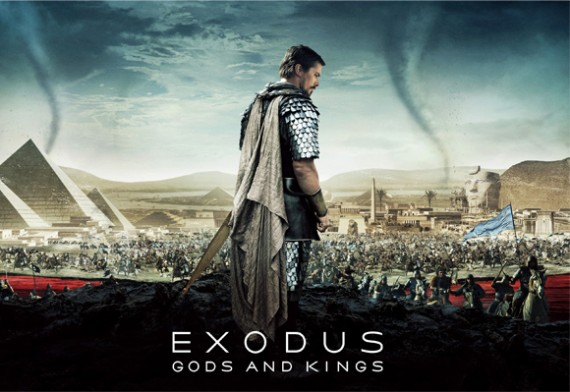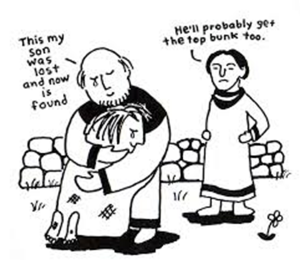“
Note: This post on the Mosaic Law is quite long. Some people asked for a PDF download.
Ask and you shall receive!
Click here to download this article as a PDF.
Christians often struggle about the place of the Mosaic Law within our lives as followers of Jesus. There are entire denominations of Christians built around a particular understanding of the Mosaic Law which separates them from others.
 Of course, such divisions over the role of the Mosaic Law in the life of the Christian are not new. This was actually one of the first and primary theological issues to create division within the early church. From the very beginning, there were questions about whether or not Gentile Christians had to obey the Mosaic Law (Answer: No. See Acts 15). As Paul went about teaching the Gospel, he constantly faced opposition from a set of Christians who believed that to truly follow Jesus, you had also obey the Mosaic Law. Even the Apostle Peter seemed to side with this group for a while (see Galatians 2).
Of course, such divisions over the role of the Mosaic Law in the life of the Christian are not new. This was actually one of the first and primary theological issues to create division within the early church. From the very beginning, there were questions about whether or not Gentile Christians had to obey the Mosaic Law (Answer: No. See Acts 15). As Paul went about teaching the Gospel, he constantly faced opposition from a set of Christians who believed that to truly follow Jesus, you had also obey the Mosaic Law. Even the Apostle Peter seemed to side with this group for a while (see Galatians 2).
Sadly, 2000 years later, we still haven’t solved this most basic of Christian dilemmas. The foundation of this argument about the Mosaic Law usually follows this pattern:
- God gave us His laws in the Bible.
- Jesus fulfilled the law (Matt 5:17)
- So now what?
Of these three items, the debate usually centers around Point 2 and Point 3. For example, we argue about what it means for Jesus to have fulfilled the law. Does this mean He did away with it? Or gave it more meaning? Or showed us its true purpose? Or affirmed its validity for all His followers? Etc., etc. Then, based on however we answer Point 2, we go on to apply this answer to Christians today by answering Point 3.
Very few people (within Evangelical circles anyway) debate Point 1. We take that as a given. We assume the truth of it. “Of course God gave us His laws!” we say. “They’re in the Bible, aren’t they? They say they are from God, don’t they?” The idea that God gave His Laws in the Bible is the premise upon which the rest of the problem is built. So nobody challenges it, and we simply move on to try to Point 2, to try and figure out what to do with the laws that are in the Bible.
If we are ever going to solve this dilemma about what to do with the Mosaic Law as Christians, we need to go back and take a careful look at Point 1, and the idea that God gave us His laws in the Bible.
Don’t get nervous. I am not about to challenge the authority or validity of the Mosaic Law as recorded in the Pentateuch. I am still a conservative Christian who believes in the inspiration and inerrancy of all Scripture.
I just think we have not done enough serious thinking about the Mosaic Law, or why God gave the Law to the Israelites. And I think that once we understand this, the question of what to do with the Mosaic Law today will become much more clear.
So let us seek to understand why God gave the Law to the Israelites. But we are not going to begin there. We must begin with the history of lawmaking itself.
The History of Lawmaking
The history of lawmaking is an interesting study. Almost any law in any country from any era has a history behind how the law became a law. In most cases, a particular law was put into effect because there were people who were behaving in a way that made the law necessary.
In a sermon I preached several years back, I list several of the crazy laws that are on the books in various cities and states. There are laws about taking pictures of rabbits in June, bouncing pickles, and underwater whistling. In the sermon, I state that as interesting as these laws are, the stories of how these laws became laws are probably even more interesting.
 But even when we think about more mundane laws, like the tax code, or campaign finance law, or even the laws about the speed you can drive or the legal drinking age, all of these laws have stories behind how they became laws.
But even when we think about more mundane laws, like the tax code, or campaign finance law, or even the laws about the speed you can drive or the legal drinking age, all of these laws have stories behind how they became laws.
And whatever these stories are, almost all of them will have certain things in common. We can pretty much guarantee that the laws were created in order to stop people from doing certain things or get them to start doing other things that they were not doing (but should have been doing). In most cases, the things that these people should not have been doing (or should have been doing) are matters of common sense, common decency, or the common good.
Since people generally lack common sense, common decency, or the desire for the common good, laws are created to keep us all in line and in check. Laws are created and enacted because some people do not properly behave. Laws often require us to do things that puts other people before ourselves and other goals before our own.
You probably have “household laws” in your own home which portray this quite well. Maybe you have rules about how much time children can spend on the computer, or who gets to sit where at mealtime, or what sort of chores need to be done before bedtime. If you think about any one of these rules, and they came into existence, you will likely recall the events and situations that led up to making such a law necessary for the happy existence of your family.
You may even have some “crazy-sounding” laws which would make absolutely no sense to any other family in history, but which make sense to you and your family because of certain situations that arose. For example, my family has a rule we follow which says this: “Dishes come before Dataseka.” Nobody else in the entire world knows what that rule means or how to follow it, but if you were to ask my wife or any of my children what it means, they would know. It’s our rule, and it has a history of how it developed, and it was created to help us live together as a happy family.
It is helpful to think about all biblical “laws” this way as well. Every law in the Bible is specific to a time and place and people. And every biblical law has a history behind it for why it was enacted and what it accomplished among the people who lived it. Yes, some of these laws, like “Do not murder,” are applicable to other times, people, and places, but that is not because all the laws are timeless decrees, but because people are people everywhere. Even if the Bible did not say, “Do not murder,” all humans everywhere naturally come up with this law against murder in order to maintain peace and stability. So even in the case of the 10 Commandments, all biblical “laws” are specific to a time and place and people, and they have a history behind how these laws were developed so that those people living in that time at that place could maintain peace and stability.
This is partly why it is so hard to understand or put into practice many of the laws we read about in the Bible. Though many of the biblical laws make sense, there are some that do not. I mean, why is it wrong to mix wool and linen (Deut 22:11). What is so terrible about cooking meat in milk (Exod 23:19)? And what’s this about determining if a woman cheated on her husband by making her drink dirt swept up from the tabernacle floor (Num 5:11-31)?
People come up with all sorts of fancy theories about these laws, but I think we have about as much chance of understanding these laws as you do of understanding what I mean when I say “Dishes come before Dataseka.”
Furthermore, even if I told you what the “Dishes come before Dataseka” law means, and even if I told you the story behind how this law developed in our family, this still would not mean that it was applicable to you or to your family, let alone applicable to all families everywhere in all places throughout time. It helps keep the peace in our family, but it would do absolutely nothing of the sort for yours.
The Mosaic Law is similar. All the laws in Leviticus, Exodus, Numbers, and Deuteronomy have a history behind them, which is specific to the people who received the laws, in the time that they received the laws, and regarding the circumstances in which they lived. While some of the laws have universal and timeless application (e.g., “Do not murder”), many of the laws have no such universal application. We don’t even know what some of these laws mean, let alone the story behind them, and even if we did know, this would not mean that we could apply these laws to our situation today. In fact, knowing what the laws mean and knowing the story behind them might actually make it clear that we could not and should not attempt to apply those laws to our lives today.
Let me say it more bluntly.
When we try to follow laws that were created for a different people, living in different times, from a difficult culture, at a different era, and in a different situation, we may actually end up sinning by following their laws, because doing so might break laws that are part of our own time and culture.
Yes, following biblical laws may actually cause you to sin.
How’s that for a shocker?
Since you might be getting nervous again about where I am going with this, let’s back up and start over.
I said that the debate about the Mosaic law followed this pattern:
- God gave us His laws in the Bible.
- Jesus fulfilled the law (Matt 5:17)
- So now what?
Then I said that part of the problem is that we usually skip any discussion about Point 1 and go directly to Point 2. In the discussion above, I briefly considered Point 1. But let’s start over and consider the discussion in the normal way. Let’s begin with Point 2 and then move backward from there into Point 1.
What is the fulfillment of the law?
I am not going to get into the debate about Matthew 5:17 or the related texts of Romans 10:4, Galatians 3:23-25, and Ephesians 2:15 about whether Jesus reconfirmed or did away with the Mosaic Law. We’ll save that debate for another time.
What is clear from Scripture (both Old and New Testaments) is that the law is accomplished and fulfilled when we love God and love others (Gal 5:14; Jas 2:8; Rom 13:8-10; 1 Tim 1:5; Deut 6:5; Matt 22:37; Luke 10:27; Mark 12:30-31). The goal of the law is love. Love is the summation of the law. Love was the defining characteristic of Jesus, who is the only person to have ever fulfilled the law. I think everybody can agree with this.
But we can go further.
Logically and theologically, not only is love the fulfillment of the law, the law is unnecessary where there is love, and the law only came into existence because love was absent.
If loving God and loving others is the fulfillment of the law, then the law is “followed” simply by loving God and loving others. If we are guided by love, then we do not need the law to guide us, because love guides us to do the things commanded by the law.
Law instructs us how to live when there is no love. When we live in love, we do not need to live under the law, because love is the purpose of the law. By living in love we naturally fulfill the instructions and guidelines of the law.
Living according to law is living according to the actions of love where there is no love. Living by law is practicing the actions of love without the attitude of love. This does not mean the law is bad! Sometimes the actions of love are needed for a safe and secure society even when there is no attitude of love. But where true love is actually present, the rules and commands for the actions of love are not needed because love performs them naturally.
Again, the story behind almost every law confirms this. Someone was doing something stupid, dangerous, foolish, or selfish that harmed other people. Why was this person doing this? Because they were not acting in love for others, but were acting only in love for self. Or maybe what they were doing was even dangerous to themselves. So a law was created to stop this dangerous behavior. But if true love was present, the law never would have been needed because the bad behavior never would have occurred.
 Of course, when laws are created as a substitute for love, people think that what is important is obedience to the law, rather than learning to love. And then they look for loopholes in the law which allows them to live selfishly and dangerously (not in love) while still obeying the letter of the law. When this happens, more laws are created to top this selfish and dangerous behavior. And pretty soon, 10 laws become 600 laws which become 6000 laws, which become 60,000 pages of laws.
Of course, when laws are created as a substitute for love, people think that what is important is obedience to the law, rather than learning to love. And then they look for loopholes in the law which allows them to live selfishly and dangerously (not in love) while still obeying the letter of the law. When this happens, more laws are created to top this selfish and dangerous behavior. And pretty soon, 10 laws become 600 laws which become 6000 laws, which become 60,000 pages of laws.
But watch this.
If one culture or group of people looks at the laws of another culture or people, whether it is the 10 laws, the 600, the 6000, or the 60,000, and says, “It sort of worked for them; we’ll do the same thing,” they will end up treating each other more miserably than any other culture. Why? Because they completely bypassed love and went straight to law! Furthermore, the laws of that other people and other culture were created out of an attempt to enforce love in that particular culture for that particular people. Those particular laws only work for them. A different people in a different culture needs to develop different laws if they are going to curb the dangerous and selfish behavior of their own people in their own culture at their own time.
But if we skip this difficult law-making process and simply adopt the laws of another culture and era, and try to follow these laws in our own culture and era, we may actually end up living in ways that are the opposite of love!
Let me provide an example.
In our culture (as in many others throughout time), we have a law that a man should be married to one woman (No, I am not talking about the definition of marriage! Put that debate aside for now. I am talking about the law against polygamy). The law says that a man should not have two or more wives. Why does the law say this? Well, in our culture, the law says this partly because the Bible says this, but even without the Bible, people in our culture believe that in general, a man who has two or more wives cannot properly love them both. To be married to more than one woman is not loving to the women. Furthermore, since our culture is roughly divided 50/50 between men and women, and man who has more than one wife is not acting in love toward all the other men who also desire to have a wife. Why should one man have ten wives while another man has none?
So you see? We have developed a law with the intended purpose of creating an atmosphere of love. Whether this law is successful or not is another question…
But note that this law that a man can only have one wife has not been universally practiced by all people in all times.
A couple years ago, I read in a book by Roland Allen about a Native American Sioux tribe in which the men were expected to have as many wives as they could support. Why? It wasn’t that men wanted to have sex with lots of women. No, due to the death of men through constant warfare with other tribes, these Native Americans always had way more women in the tribe than they had men. So, in an attempt to take care of the women in the tribe (and to replenish the tribal population), it was decided that each man should have as many wives as he could support. He was expected to care for them, provide for them, and protect them. Without such polygamy, most of the women likely would have starved … At least, this is how it was explained to the European missionaries who came to teach the Gospel to this particular Native American tribe.
The missionaries, of course, were appalled to discover that the chieftain of this tribe had many wives! After all, the Bible says that marriage should be between one man and one woman! So when this chieftain became a Christian, the missionaries told him that the first thing he needed to do as a follower of Jesus was put away all of his wives except one.
So what did the Chieftain do? He went home, and, with a heavy heart, chose the one wife he would keep. Then he hanged the rest.
When he told the missionaries what he had done, they were more horrified than before. He explained to them that if he had put away all of his wives, they would have starved to death, and he thought that killing them was more loving than letting them starve. The missionaries informed him that God would have taken care of his other wives, but now that he had murdered them, he could not ever be a Christian. So the Chieftain went back to his Native American beliefs and ways.
Do you see? Laws that are intended to produce loving actions in one culture with one particular people in a particular set of circumstances, may actually produce unloving actions when applied to another group of people in a different set of circumstances.
This account might seem like an extreme case, but is it?
If we were to blindly follow some of the Mosaic laws simply “because they’re in the Bible,” we would be led into some horribly unloving behavior. Like making your wife drink muddy water because you think she cheated on you. Like stoning your children because they’re disrespectful. Like killing a man for picking up sticks on the Sabbath. Like slaughtering bulls and goats and chickens because you feel guilty about something you did.
So we are right back to the same shocking point from before. Following the biblical law may actually cause us to sin!
In fact, this is exactly what Jesus taught as well.
Jesus vs. the Religion of Law
In Jesus’ day, the Pharisees and Sadducees were the most scrupulous of law-keepers. And while nobody could accuse them of breaking the law, few people would have thought of them as overly loving. Oh sure, they loved those who loved them, and loved those who kept the law like they did. But when someone opposed their teaching or broke the law, they would not think twice about breaking fellowship with such a person, bringing them before the courts for condemnation, or seeking to have them stoned to death.
This is why Jesus had so many negative encounters with these religious leaders. He lived in love which often required Him to live outside their law. When faced with love or law, Jesus always chose love. Jesus knew that even if love did not fulfill the letter of the law, it always fulfilled the spirit of the law. If love is the purpose of the law, then love never fails to fulfill the spirit of the law. But following biblical law simply “because it’s the law” may actually cause you to sin if the application of that law today no longer comes from and leads to love.
So even in the life and example of Jesus, we have come back around to the same truth as before: Following biblical laws may actually cause you to sin.
While it is possible to follow the law in an unloving way, it is impossible to love in an unloving way, or even to love in an unlawful way. Remember, the fruit of the spirit is love … and against such things there is no law (Gal 5:23).
Hurtful Mosaic Laws
For those who are still a bit skeptical, there are several examples from the Mosaic Law which reveal loving actions in their day, but which would nevertheless be hateful and hurtful actions in ours. Several of the laws about women and slaves, for example, were huge movements toward love in the days when the law was given and both women and slaves were treated like property. In many ways, the law of Moses gave value and dignity to women and slaves that was unprecedented among other people and cultures of that time.
However, if we were to treat women today as the Mosaic law stipulates they are to be treated, such behavior toward women today would be misogynistic, sexist, cruel, and mean. The law of love as exemplified in Jesus Christ has brought about better treatment of women today than anything that the Mosaic Law could accomplish through law keeping.
The same goes for slavery. The Mosaic law assumes that slavery was a way of life and provided laws based upon this cultural assumption. But today, most people know that slavery is wrong. It is a great evil for one person to own another. But the Bible says nothing of the sort.
In both these cases (and in many others), an attempt to follow the biblical law would not be a step forward in godliness and Christlikeness, but a huge step backward. And not just backward, but back into serious sin.
Any man who exactly follows what the biblical Mosaic law says about women or slaves should be arrested and sent to prison.
In Moses’ day, the law was a huge step forward for love. But in our day, it would be a giant step backward. It was a step backward even in Jesus’ day, which is why He didn’t exactly follow the law in every case. He didn’t allow the woman caught in adultery to be stoned to death. He let His disciples do “work” on the Sabbath. He Himself performed work on the Sabbath. He touched lepers and dead people. All of these were loving actions that technically “broke” various aspects of the Mosaic Law.
But did Jesus fulfill the Mosaic Law? Of course He did! Because the fulfillment of the law is love.
But if Jesus had focused on the law instead of on love, He would not have been as loving as He was.
To the contrary, if Jesus had focused on the Mosaic law instead of on love, He would have been a religious sinner.
This is partly why any Christian today that uses the Mosaic Law as a foundation for their behavior is often viewed as less loving than their unchristian friends and neighbors. The Mosaic Law is less loving than where the rest of the culture is at today.
This doesn’t mean that the culture has love figured out and we should follow their cues. Of course not.
But we must not begin to think that because the law worked for Moses and the Israelites 3500 years ago as they wandered around a desert that it will work for us today. The Mosaic Law wasn’t meant to be a universal guideline for all people everywhere throughout time on how to behave. When we use it this way, we end up behaving in ways that are less loving than many of those today who live without the law.
So Why Did God Give the Law?
If all of this is true, why didn’t God inspire Moses to just write down “Love one another” and leave it at that?
Why did he write all those laws? Why didn’t God appear to Moses and say, “Just tell them to love me and love each other and all will be well”?
If love fulfills the law and if obeying the law can often be less loving than simply loving without the law, why doesn’t the law consist of one word: “Love”?
Why didn’t God appear on Mount Sinai and say, “Love Me. Love each other. Now let’s go”?
The truth is that this is exactly what God did say. Or near enough.
To understand the origin of the law, we need to return to the history of lawmaking again, only this time, we must look specifically at the history of the Mosaic Law.
In the beginning, God wanted an intimate one-to-one relationship with each of us (as we live in community with others). He wanted to speak to us, walk with us, and be with us, as a friend. But when Adam and Eve ate from the forbidden tree, one of the fallouts was the destruction of this intimate relationship that God desired to have with us.
Nevertheless, God continued to work toward the goal of relationship. This is partly why God initiated a relationship with Abraham.
When Moses and the Israelites came to Mount Sinai, before any law was given, God invited all the Israelites to the base of the mountain to speak with Him (Exod 19:11). They were all welcome. He invited them to be a kingdom of priests (Exod 19:6). But when God drew near, the people were afraid (Exod 19:16; 20:18), and asked for Moses to be a mediator between them and God. They did not want to speak with God. They wanted Moses to speak to God for them and then pass on to them whatever it was God said.
As a result of the people’s rejection of love, God instituted a religion of law for the people of Israel (Exodus 21–31). This is not because law is better, but because laws are needed where there is no attitude of love. So God gave them a priesthood to mediate between Himself and His people. He gave them instructions about a tabernacle. And He provided basic instructions for how to get along in community with one another.
This religion of laws was not His ideal plan for them, but He gave it to them because this is what they wanted. They did not want an intimate relationship with God where He spoke to them. They wanted to keep their distance from God. And so, just as God later provided a king to the people because they wanted a human king instead of God as their king, He also provided religion because they wanted a human priesthood and physical tabernacle instead of a daily, intimate, direct relationship with God.
Though God wanted and offered a relationship based on love, the people rejected this offer and asked for a religion based on laws. So God gave it to them, even though it was not best.
But just as God provided a human king in part to show the failure of human kings, so also, God provide a human religion in part to show the failure of human religion. This truth is one of the main truths we learn from the Pentateuch. God provided religion to show that religion does not lead people to God, but away from God. Religion separates and divides. It never restores and heals.
So when the people of Israel reject a relationship of love in favor of a religion of law, it is not surprising that this religion of law exponentially increases in complexity. Laws only give birth to more laws. They never give birth to relationship.
 This pattern of separation from God which leads to further religion continues throughout the Pentateuch. After the Israelites reject the relationship from God, they are given the 10 commandments. But then they create the golden calf and worship it instead of God, and so they are given more laws with greater degrees of intricacy and duty (Exodus 32ff). Later, however, they are found guilty of making sacrifices to demonic idols (Lev 17:7ff), and so God adds further laws and regulations about the sacrificial system. In the Pentateuch, the 10 laws eventually get amplified into over 600.
This pattern of separation from God which leads to further religion continues throughout the Pentateuch. After the Israelites reject the relationship from God, they are given the 10 commandments. But then they create the golden calf and worship it instead of God, and so they are given more laws with greater degrees of intricacy and duty (Exodus 32ff). Later, however, they are found guilty of making sacrifices to demonic idols (Lev 17:7ff), and so God adds further laws and regulations about the sacrificial system. In the Pentateuch, the 10 laws eventually get amplified into over 600.
God wanted a relationship with the people, but when they refused the relationship, and turned instead to sin and to religion, God was forced to incarnate Himself within the religion so that He could draw them out of it.
The desire was love. But when love was rejected, and this rejection results in sin, laws must be added to create the culture and actions of love, even when there was no attitude of love.
The Law Was Added Because of Sin
So what we see is that the origin of the law is due to sin … which sounds surprisingly similar to what Paul says in Galatians 3:19. He says that “the law was added because of transgression.” People usually understand Paul as saying that “the law was given to us so that it could reveal our sin to us.” But that is not at all what Paul is saying, and this explanation doesn’t fit the context, nor does such an understanding fit with why laws are really added.
As we have seen in the Pentateuch, the Mosaic Laws were not added to reveal sin to people, but rather, because the people had sinned. This is exactly what Paul says in Galatians 3:19. The law was added because of transgression, that is, because of sin.
When read from this perspective, the purpose of the Pentateuch is not for God to provide a set of laws which all people everywhere should follow. No! The point of the Pentateuch is to show that complete failure of law and religion to lead to the relationship of love that God wants with His people. John Sailhamer defends this idea in his book The Meaning of the Pentateuch.
Love vs. Law
The point for us today is this: If a person does not truly want a relationship with God, God will not let that fear get in His way of loving them. He will accept their love in any way they can offer it, even if it is through the broken methods of human religion.
Nevertheless, religion is so broken, the only thing it really leads to is greater guilt, condemnation, laws, obligation, and separation from God. God knows this, which is why He allows us to travel down the path of religion for a while. He knows that religion leads only to dead ends. He lets us practice our dead-end religions so that we can discover that the only way to connect with God is to directly connect with God. All the mediators, temples, laws, and rituals only separate us further from God and lead only to frustration and failure.
When we follow God by faith, we discover that He leads us away from religion. And the closer we truly get to God, the less religion we want or need.
But for those who fear to approach God on their own, God is more than willing to call to them from within the confines of religion. If people are like the Israelites at Mount Sinai, and are too afraid to approach God, or do not know if they can trust Him, He is willing to let them approach Him through priestly mediators, written precepts, and holy places, knowing that many will eventually see the emptiness of religion, and will seek Him directly as He has always wanted.
I sometimes view religion as “training wheels” for learning to approach God directly. Of course, the wheels of religion are busted and falling off, but that’s the point. Eventually, people wise up to the fact that religion isn’t helping them connect with God, and the vast majority of these people start to seek God in alternative ways, usually in a community of other like-minded people, which is what God has always wanted in the first place.
Religion is a Form of Idolatry
But notice that since religion is a substitute for God Himself, religion is a form of idolatry.
If God wants to teach us directly but we prefer to hear from Him from pastors and priests, and if God wants to meet with us personally but we prefer to approach Him through temples and rituals, then we have substituted these things for God Himself. This is idolatry. Nevertheless, God is patient with us and if this is the only way we are comfortable approaching Him, He accepts it as better than nothing.
God never wanted sacrifices and blood offerings, but as the Pentateuch reveals, the Israelite people were intent on giving sacrifices and blood. And they initially did so to golden calves (Exodus 32) and goat demons (Leviticus 17). So God taught them that if they were intent on offering dead animals and blood, they might as well do it to Him, but with certain restrictions and guidelines.
If the people had been in a relationship with God, they would have known that God did not want or need these things. But since the people rejected the relationship in favor of religion, God did what He could with their religion of sacrifices and offerings to redeem it and eventually rescue them from it. The Israelite religion was, in general, more humane than the other religions of that time. No human sacrifice was acceptable at any time for any reason. Though animals were allowed to be killed, they were not allowed to be tortured. Slaves were given certain rights. So were women and children.
God always incarnates Himself into whatever situation people are in so that He can lead them out of their sin and into a relationship with Him. In the case of Israel, God entered into the religion they wanted so that He could lead them out of it and into the loving relationship He wanted for them. Even at the end of the Pentateuch, both God and Moses indicate their knowledge that the religion of law would be a complete failure (Deut 31:16-29). It is because of this impending failure of the religion of law that Moses predicted a better covenant would come which would be based on relationship rather than religious laws and regulations (cf. this article on Deut 30:11-14).
All of this is why Paul in Galatians and the author of Hebrews are so shocked that some of the new Christians are returning once again to the religion of law. Since God has always wanted a relationship of love with us, and all people can now have this relationship through Jesus Christ by the indwelling Holy Spirit, why would we want to return to the failed and idolatrous religion of law?
Yes, there are laws, and yes, these laws came from God, and therefore, these laws were good. However, these laws were never the ideal, but were always (and only) a poor substitute for love. They were, at best, a way to lead us toward love. They were a tutor, says Paul, to lead us to Christ (Gal 3:24).
God always wanted a kingdom of priests where we each approach Him directly, and in Jesus Christ, that is exactly what we have become (1 Pet 2:9). But when we relinquish that privilege to some other human being, or to some system of rules and regulations, or only to a sacred space on a holy day, we have backed away from God Himself and have turned once again to religion.
However, much like the Israelites of old, God will use religion if He must. It is not His ideal, but life rarely matches God’s ideal. God works with us as He finds us to lead us where He wants us.
And where is God leading us? Toward love.
God wants a relationship of love with each of us. But when love is rejected, the only thing left is law. In the absence of love, law guides our actions until we learn to love. Laws exist where love does not. Laws call us to perform the actions that love performs automatically. While it is possible to obey the law and not be loving, it is never possible to love and not fulfill the law.
In fact, if we focus on the law, we often become less loving! But if we focus on loving God and others, we naturally fulfill the law.
So what about the law? Forget about it! Just love and you will fulfill the spirit of the law!













 But in the face of this grotesque depiction of a manmade-God, God has been trying to show us since the very beginning in Genesis 1, that He is a God of light, love, hope, healing, mercy, grace, and forgiveness. As a result of God’s eternal love, He created human beings so that we might love Him in return. He wants our love, but knowing that He cannot force love, He woos us and invites us and calls us to Him, but we, being the worst of all possible lovers, slander His name, drag Him through the mud, tie Him up in a dark corner, and eventually even crucify Him on a barren hill. And all the while we declare that it is God Himself telling us to do these things.
But in the face of this grotesque depiction of a manmade-God, God has been trying to show us since the very beginning in Genesis 1, that He is a God of light, love, hope, healing, mercy, grace, and forgiveness. As a result of God’s eternal love, He created human beings so that we might love Him in return. He wants our love, but knowing that He cannot force love, He woos us and invites us and calls us to Him, but we, being the worst of all possible lovers, slander His name, drag Him through the mud, tie Him up in a dark corner, and eventually even crucify Him on a barren hill. And all the while we declare that it is God Himself telling us to do these things. If the Christ is the Suffering King who bleeds and dies for His enemies, who loves and accepts all, and who has no desire to control others but only to serve them, then any “Christ” which is used to defend war and violence toward enemies, to reject and divide from others, and to control and manipulate others for personal gain, is the anti-Christ.
If the Christ is the Suffering King who bleeds and dies for His enemies, who loves and accepts all, and who has no desire to control others but only to serve them, then any “Christ” which is used to defend war and violence toward enemies, to reject and divide from others, and to control and manipulate others for personal gain, is the anti-Christ. 
 I wrote previously about
I wrote previously about 
 Furthermore, the “older son” is the worst kind of “lost son” because we think we have stayed with God our Father, when in reality, we have gone into the far country of religion, which allows us to look down our self-righteous noses at everybody else who is not good enough, smart enough, or disciplined enough to truly live for God.
Furthermore, the “older son” is the worst kind of “lost son” because we think we have stayed with God our Father, when in reality, we have gone into the far country of religion, which allows us to look down our self-righteous noses at everybody else who is not good enough, smart enough, or disciplined enough to truly live for God.  The younger son only gets his party when he realizes how much he has screwed up and how much his father loves and forgives him. That’s when the party begins for him.
The younger son only gets his party when he realizes how much he has screwed up and how much his father loves and forgives him. That’s when the party begins for him. 


 I sometimes think Christianity would be far better off if we just all shut our mouths.
I sometimes think Christianity would be far better off if we just all shut our mouths. 

 This is a guest post by Michael Thompson. Michael currently works at Denso Manufacturing TN as Expatriate Support. He is married to his wife Rachel, and they have two children (two and four-year-old). Michael also plays keyboard for Hope Church in Knoxville TN.
This is a guest post by Michael Thompson. Michael currently works at Denso Manufacturing TN as Expatriate Support. He is married to his wife Rachel, and they have two children (two and four-year-old). Michael also plays keyboard for Hope Church in Knoxville TN.  When my wife started attending college her father served as an elder in their church. Even though she was very involved with her youth group and loved her church, she didn’t feel comfortable talking about sexual struggles with anyone at church or her family. These subjects were considered inappropriate for discussion.
When my wife started attending college her father served as an elder in their church. Even though she was very involved with her youth group and loved her church, she didn’t feel comfortable talking about sexual struggles with anyone at church or her family. These subjects were considered inappropriate for discussion.


